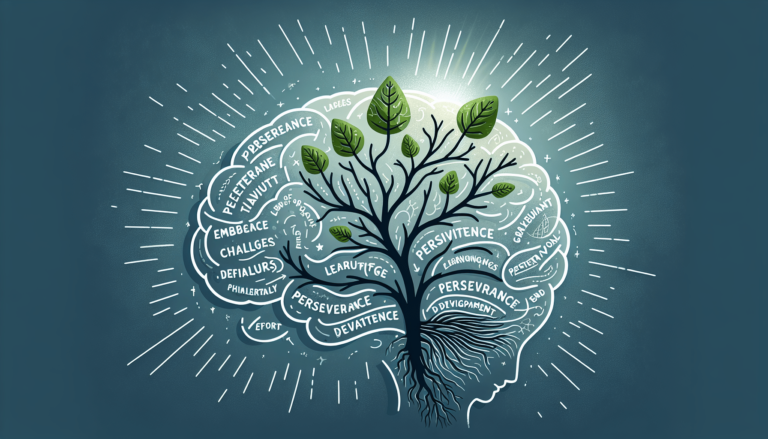The Journey From Self-Doubt To Self-Confidence
Have you ever struggled with self-doubt? Don’t worry, you’re not alone. In this article, we’ll explore the transformative journey from self-doubt to self-confidence, giving you valuable insight and practical tips along the way. We’ll delve into the root causes of self-doubt, discuss its impact on our lives, and uncover strategies to build genuine self-confidence. Get ready to embark on a journey of self-discovery and empowerment, as we guide you on the path towards embracing your true potential.

Understanding self-doubt and self-confidence
Self-doubt and self-confidence are two sides of the same coin when it comes to personal growth and decision-making. Understanding these concepts is crucial in our journey towards building a healthy mindset and achieving our goals.
Defining self-doubt
Self-doubt can be described as a lack of confidence in oneself and one’s abilities. It is the nagging voice in your head that questions your actions, abilities, and worth. When you doubt yourself, it becomes challenging to take risks, make decisions, and fully embrace opportunities that come your way.
Exploring self-confidence
On the other hand, self-confidence is the belief in your capabilities and worth. It is the unshakable faith in yourself that allows you to tackle challenges and pursue your dreams with conviction. Self-confidence empowers you to take risks, make decisions, and persist in the face of obstacles.
Recognizing the impact of self-doubt
Self-doubt can have a profound impact on personal growth and decision-making. Recognizing how it hinders our progress is the first step towards overcoming it.
How self-doubt hinders personal growth
Self-doubt acts as a roadblock on the path to personal growth. It keeps us stuck in our comfort zones and prevents us from taking risks or trying new experiences. By constantly questioning our abilities, self-doubt feeds into fear and prevents us from reaching our full potential.
The role of self-doubt in decision-making
Self-doubt also plays a significant role in decision-making. It causes us to question our judgment and second-guess ourselves. This hesitancy and lack of conviction can lead to missed opportunities and regret. Self-doubt creates a cycle of indecision and can hinder our ability to make choices that align with our values and aspirations.
Identifying the root causes of self-doubt
To overcome self-doubt, it is crucial to identify its root causes. Understanding where it stems from empowers us to address those underlying issues and cultivate self-confidence.
Past experiences and traumas
Our past experiences and traumas can leave deep scars that perpetuate self-doubt. Negative past experiences, such as failures or criticism, can create a fear of repeating those mistakes or facing judgment from others. By acknowledging and healing from these past wounds, we can start to build a stronger foundation of self-confidence.
External influences and societal pressures
The expectations and pressures imposed by society, family, or peers can significantly impact our self-doubt. Comparing ourselves to others, feeling inadequate in the face of societal norms, or striving for perfection can fuel our doubts. Recognizing the influence of these external forces allows us to challenge their validity and prioritize our own self-worth.
Negative self-talk and internal dialogue
The way we talk to ourselves plays a crucial role in shaping our self-perception. Negative self-talk and constant self-criticism can erode our self-confidence and perpetuate self-doubt. Developing awareness of our internal dialogue and consciously replacing negative thoughts with positive affirmations can help build a more supportive mindset.
Developing self-awareness
Self-awareness is the key to understanding ourselves better and cultivating self-confidence. It involves reflecting on our thoughts, emotions, and behaviors, and gaining insight into our strengths and areas for growth.
The importance of self-reflection
Self-reflection is a powerful tool for developing self-awareness. Taking the time to ask ourselves meaningful questions, journaling, or seeking therapy can help us uncover the underlying triggers of self-doubt and gain clarity on our values and aspirations. It allows us to identify patterns and make intentional changes.
Practicing mindfulness and meditation
Practicing mindfulness and meditation can help cultivate self-awareness by grounding us in the present moment and quieting the inner chatter. These practices allow us to observe our thoughts and emotions without judgment, creating space for self-compassion and self-acceptance. Regular mindfulness and meditation practices can strengthen our ability to recognize and navigate self-doubt.

Challenging negative beliefs and thoughts
To overcome self-doubt, it is essential to challenge the negative beliefs and thoughts that fuel it. By reframing our perspective and adopting a more positive mindset, we can build self-confidence and resilience.
Recognizing cognitive distortions
Cognitive distortions are irrational thought patterns that contribute to self-doubt. These distortions include catastrophizing, overgeneralization, and personalization, among others. By becoming aware of these distortions and challenging them with evidence-based thinking, we can shift our perspective and build more realistic beliefs about ourselves.
Reframing negative self-perceptions
Reframing negative self-perceptions involves consciously replacing self-criticism with self-compassion and positive affirmations. Instead of dwelling on perceived weaknesses or failures, we can focus on our strengths and accomplishments. By reframing our self-perception in a more empowering and compassionate way, we can build self-confidence and resilience.
Building a supportive network
Surrounding yourself with positive influences is crucial in overcoming self-doubt and fostering self-confidence. Building a supportive network of friends, mentors, and coaches can provide encouragement, guidance, and a sense of belonging.
Surrounding yourself with positive influences
Choose to spend time with people who uplift and support you. Surrounding yourself with individuals who believe in your abilities and celebrate your successes can boost your self-confidence. Seek out positive role models and engage in communities that share your interests and values.
Seeking guidance from mentors and coaches
Mentors and coaches can provide valuable insights and guidance in your journey towards self-confidence. They can offer objective perspectives, help you set realistic goals, and provide strategies to overcome self-doubt. Seeking their guidance and leveraging their expertise can accelerate your personal growth and development.
Setting achievable goals
Setting achievable goals is an essential step in building self-confidence. Breaking down larger goals into smaller, manageable tasks increases the likelihood of success and boosts our confidence along the way.
Breaking down goals into smaller tasks
Taking on a massive goal can be overwhelming and contribute to self-doubt. By breaking down your goals into smaller, actionable tasks, you can create a roadmap for progress. Celebrating each task’s completion provides a sense of accomplishment, reinforcing your belief in your abilities.
Celebrating small victories
Celebrating even the smallest victories is crucial in building self-confidence. Recognize and reward yourself for every milestone achieved, no matter how seemingly insignificant. Celebrating these victories acknowledges your progress and reinforces your belief in your capabilities.
Embracing failure as a learning opportunity
Failure is an inevitable part of life, but it doesn’t have to be a source of self-doubt. Embracing failure as a learning opportunity can help shift our perspective and foster resilience.
Changing the perspective on failure
Rather than viewing failure as a reflection of personal inadequacy, see it as an opportunity for growth and learning. Recognize that setbacks and mistakes are stepping stones towards success. Embracing this mindset allows you to bounce back stronger and approach future challenges with renewed confidence.
Extracting lessons from setbacks
Every setback holds valuable lessons for personal growth. Take the time to reflect on what went wrong and identify the lessons you can learn from the experience. By extracting these lessons and incorporating them into your future endeavors, you can turn setbacks into stepping stones towards self-confidence.
Practicing self-care and self-compassion
Taking care of your physical and mental well-being is essential for overcoming self-doubt and nurturing self-confidence. Prioritizing self-care and practicing self-compassion creates a solid foundation for personal growth.
Prioritizing physical and mental well-being
Make time for activities that nourish your body and mind. Engage in regular exercise, eat nourishing foods, get enough sleep, and engage in hobbies that bring you joy. Taking care of your physical and mental health provides the energy and clarity needed to navigate self-doubt and build self-confidence.
Being kind and forgiving towards oneself
Practicing self-compassion involves treating yourself with the same kindness and understanding you would extend to a close friend. Acknowledge that everyone makes mistakes and experiences self-doubt at times. When self-doubt arises, offer yourself words of encouragement and remind yourself of your worth and capabilities.
Taking action and stepping out of the comfort zone
To build self-confidence, it is essential to take action and step out of your comfort zone. Embrace new experiences and challenges that push your boundaries.
Conquering fear through gradual exposure
Fear often fuels self-doubt and holds us back from taking action. By gradually exposing yourself to the things that make you uncomfortable, you can desensitize yourself to fear. Start with small steps and gradually increase the level of challenge. Each successful step builds your self-confidence and diminishes the power of self-doubt.
Experimenting with new experiences and challenges
Taking on new experiences and challenges expands your comfort zone and builds self-confidence. Embrace opportunities to learn and grow, even if they initially seem daunting. Remember, every experience is an opportunity for personal development and an invitation to uncover your true potential.
In conclusion, understanding self-doubt and self-confidence is essential in our journey towards personal growth and success. By recognizing the impact of self-doubt, identifying its root causes, developing self-awareness, challenging negative beliefs, building a supportive network, setting achievable goals, embracing failure, practicing self-care and self-compassion, and taking action, we can overcome self-doubt and cultivate self-confidence. Remember, the journey from self-doubt to self-confidence is a process, but with dedication and perseverance, you can transform your mindset and achieve your goals.







